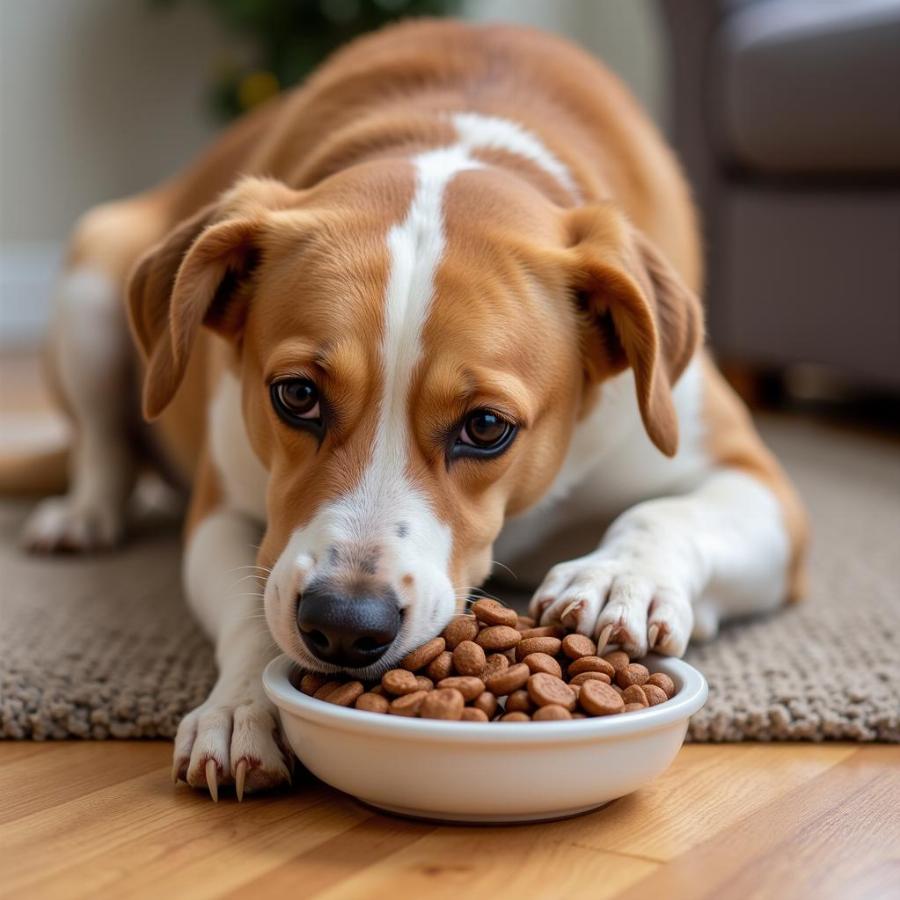Foster Farms corn dogs are a popular snack, but they aren’t designed for our furry friends. While the tempting aroma might pique your dog’s interest, it’s crucial to understand that certain human foods, including processed snacks like corn dogs, can be harmful to canine health. This article will explore why corn dogs are not suitable for dogs and provide valuable insights into canine nutrition and safe snacking options for your beloved pet.
Why Foster Farms Corn Dogs Are Not For Dogs
While the occasional small nibble of plain, cooked hot dog (not the whole corn dog) might not cause immediate harm, feeding your dog Foster Farms corn dogs regularly can lead to various health issues. The high fat content can contribute to pancreatitis, a painful and potentially life-threatening inflammation of the pancreas. The high sodium levels can also cause dehydration and, in severe cases, sodium ion poisoning.
What’s more, the corn dog’s breading adds unnecessary carbohydrates and can upset your dog’s digestive system, leading to vomiting and diarrhea. The stick itself poses a choking hazard or, if swallowed, could cause internal injuries.
What if my dog accidentally eats a Foster Farms corn dog? If your dog manages to snatch a bite, monitor them closely for any signs of distress, such as vomiting, diarrhea, lethargy, or abdominal pain. If you notice any of these symptoms, contact your veterinarian immediately.
Healthy Snack Alternatives for Your Dog
Instead of offering your dog potentially harmful human snacks, provide them with treats specifically designed for their dietary needs. Numerous healthy and delicious options are available, ranging from commercially produced dog biscuits and chews to simple homemade treats.
What are some healthy homemade dog treat options? Consider making simple treats using ingredients like plain cooked chicken, sweet potato, or carrots. These are nutritious, easily digestible, and much safer for your furry friend than processed human food.
Understanding Your Dog’s Nutritional Needs
Providing your dog with a balanced and nutritious diet is essential for their overall health and well-being. Consult your veterinarian to determine the best diet plan for your dog’s specific breed, age, activity level, and any existing health conditions.
What are the essential nutrients for a dog’s diet? A balanced canine diet should include proteins, fats, carbohydrates, vitamins, and minerals in appropriate proportions. Your veterinarian can recommend a high-quality dog food that meets these requirements.
 Dog Enjoying a Healthy Meal
Dog Enjoying a Healthy Meal
Ensuring a Safe Environment for Your Dog
Beyond dietary considerations, creating a safe environment for your dog is crucial. This includes keeping potentially harmful foods out of reach and ensuring they have access to fresh water at all times.
What are some common household hazards for dogs? Common household hazards include cleaning products, medications, certain plants, and small objects that could be swallowed. Be vigilant about keeping these items away from your dog.
Conclusion
While Foster Farms corn dogs might be a tasty treat for humans, they are not suitable for our canine companions. Prioritizing your dog’s health and well-being by offering them safe and nutritious treats and maintaining a safe environment is essential for a long and happy life together. Remember, a healthy dog is a happy dog!
FAQ
- Can dogs eat the stick from a corn dog? No, the stick is a choking hazard and could cause internal injuries if swallowed.
- What should I do if my dog eats a whole corn dog? Contact your veterinarian immediately and monitor your dog for signs of distress.
- Are there any human foods that are safe for dogs? Yes, some human foods, like plain cooked chicken or carrots, can be given to dogs in moderation. Always consult your veterinarian.
- What is the best way to ensure my dog’s nutritional needs are met? Feed your dog a high-quality dog food recommended by your veterinarian.
- How can I create a safe environment for my dog? Keep potentially harmful substances and objects out of reach.